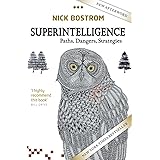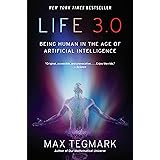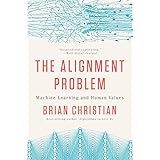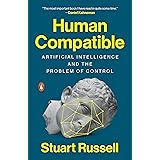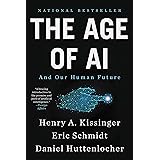
Download the free Kindle app and start reading Kindle books instantly on your smartphone, tablet, or computer - no Kindle device required.
Read instantly on your browser with Kindle for Web.
Using your mobile phone camera - scan the code below and download the Kindle app.

OK
 Audible sample Sample
Audible sample Sample 


The Master Algorithm: How the Quest for the Ultimate Learning Machine Will Remake Our World Paperback – February 13, 2018
Purchase options and add-ons
Recommended by Bill Gates
A thought-provoking and wide-ranging exploration of machine learning and the race to build computer intelligences as flexible as our own
In the world's top research labs and universities, the race is on to invent the ultimate learning algorithm: one capable of discovering any knowledge from data, and doing anything we want, before we even ask. In The Master Algorithm, Pedro Domingos lifts the veil to give us a peek inside the learning machines that power Google, Amazon, and your smartphone. He assembles a blueprint for the future universal learner--the Master Algorithm--and discusses what it will mean for business, science, and society. If data-ism is today's philosophy, this book is its bible.
- Print length352 pages
- LanguageEnglish
- PublisherBasic Books
- Publication dateFebruary 13, 2018
- Dimensions5.45 x 1.2 x 8.25 inches
- ISBN-100465094279
- ISBN-13978-0465094271
The Amazon Book Review
Book recommendations, author interviews, editors' picks, and more. Read it now.
Frequently bought together

Similar items that may deliver to you quickly
From the Publisher
|
|
|
|
|
|---|---|---|---|
|
|
|
|
|
Editorial Reviews
Review
"Pedro Domingos demystifies machine learning and shows how wondrous and exciting the future will be."―Walter Isaacson, New York Times bestselling author of Steve Jobs, The Innovators, and The Code Breaker
"An impressive and wide-ranging work that covers everything from the history of machine learning to the latest technical advances in the field."―Daily Beast
"Domingos writes with verve and passion."―New Scientist
"Unlike other books that proclaim a bright future, this one actually gves you what you need to understand the changes that are coming."―Peter Norvig, Director of Research, Google andcoauthor of Artificial Intelligence: A Modern Approach
"Domingos is the perfect tour guide from whom you will learn everything you need to know about this exciting field, and a surprising amount about sience and philosophy as well."―Duncan Watts, Principal Researcher, Microsoft Research, and author of Six Degrees and Everything Is Obvious *Once You Know the Answer
"[The Master Algorithm] does a good job of examining the field's five main techniques.... The subject is meaty and the author...has a knack for introducing concepts at the right moment."―The Economist
"Domingos is a genial and amusing guide, who sneaks us around the backstage areas of the science in order to witness the sometimes personal (and occasionally acrimonious) tenor of research on the subject in recent decades."―Times Higher Education
"An exhilarating venture into groundbreaking computer science."―Booklist, starred review
"[An] enthusiastic but not dumbed-down introduction to machine learning...lucid and consistently informative.... With wit, vision, and scholarship, Domingos decribes how these scientists are creating programs that allow a computer to teach itself. Readers...will discover fascinating insights."
―Kirkus Reviews
"This book is a must have to learn machine learning without equation. It will help you get the big picture of the several learning paradigms. Finally, the provocative idea is not only intriguing, but also very well argued."―Data Mining Research
"If you are interested in a crash course on the enigmatic field of machine learning and the challenges for AI practitioners that lie ahead, this book is a great read."―TechCast Global
"This book is a sheer pleasure, mixed with education. I am recommending it to all my students, those who studied machine learning, those who are about to do it and those who are about to teach it."―Judea Pearl, author of The Book of Why, and professor of computer science, UCLA and winner of the A. M. Turing Award
"Machine learning is the single most transformative technology that will shape our lives over the next fifteen years. This book is a must-read--a bold and beautifully written new framework for looking into the future."―Geoffrey Moore, author of Crossing the Chasm
"Machine learning is a fascinating world never before glimpsed by outsiders. Pedro Domingos initiates you to the mysterious languages spoken by its five tribes, and invites you to join in his plan to unite them, creating the most powerful technology our civilization has ever seen."―Sebastian Seung, professor, Princeton, and author of Connectome
"A delightful book by one of the leading experts in the field. If you wonder how AI will change your life, read this book."―Sebastian Thrun, research professor, Stanford, Google Fellow and Inventor of the Self-Driving Car
"This is an incredibly important and useful book. Machine learning is already critical to your life and work, and will only become more so. Finally, Pedro Domingos has written about it in a clear and understandable fashion."―Thomas H. Davenport, Distinguished Professor, Babson College and author of Competing on Analytics and Big Data @ Work span
"Machine learning, known in commercial use as predictive analytics, is changing the world. This riveting, far-reaching, and inspiring book introduces the deep scientific concepts to even non-technical readers, and yet also satisfies experts with a fresh, profound perspective that reveals the most promising research directions. It's a rare gem indeed."―Eric Siegel, founder of Predictive Analytics World and author of Predictive Analytics: The Power to Predict Who Will Click, Buy, Lie, or Die
About the Author
Product details
- Publisher : Basic Books; Reprint edition (February 13, 2018)
- Language : English
- Paperback : 352 pages
- ISBN-10 : 0465094279
- ISBN-13 : 978-0465094271
- Item Weight : 10.2 ounces
- Dimensions : 5.45 x 1.2 x 8.25 inches
- Best Sellers Rank: #63,062 in Books (See Top 100 in Books)
- Customer Reviews:
About the author

Pedro Domingos is a leading AI researcher and the author of the worldwide bestseller "The Master Algorithm", an introduction to machine learning for a general audience. He is a professor of computer science at the University of Washington in Seattle. He won the SIGKDD Innovation Award and the IJCAI John McCarthy Award, two of the highest honors in data science and AI, and is a Fellow of AAAS and AAAI. He has written for the Wall Street Journal, Scientific American, Wired, and others, and is a highly sought-after speaker.
Customer reviews
Customer Reviews, including Product Star Ratings help customers to learn more about the product and decide whether it is the right product for them.
To calculate the overall star rating and percentage breakdown by star, we don’t use a simple average. Instead, our system considers things like how recent a review is and if the reviewer bought the item on Amazon. It also analyzed reviews to verify trustworthiness.
Learn more how customers reviews work on Amazon-
Top reviews
Top reviews from the United States
There was a problem filtering reviews right now. Please try again later.
Yet I loved this book, it opened my eyes on a world I suspected existed somewhere in the depths of my computer or when I did a Google search but that I never understood. If you are afraid to be engulfed in equations, don't be. The author prefers to use allegories and is very good at giving simple explanations, making everything (almost) crystal clear.
What you get is a comprehensive overview of where machine learning is going. This is hugely important, considering the sometimes disturbing news you get in the media - not just from Snowden but also from "neurotechnologists" who guide political campaigns by embedding cameras in ads, cameras that detect the viewers' reactions and then adjust the campaign in function of these reactions.
Perhaps my only quarrel with this book - but it does not detract from its excellence and the five stars I gave it - is the philosophical position taken by the author. I don't quite share his optimism about our robotic future. And this for 2 reasons:
One, the connection between learning algorithms and data. Domingos does note at the outset: "...the more data they [the learners] have, the more intricate the algorithms can be." So without "big data", you don't get "good" learning algorithms - the "bigger" the data, the better the algorithm. Or as Domingos writes, "the more data we have, the more we can learn". True enough. But what about the quality and size of the big data? What if the data is error-filled and we're not aware of it? Can machine learning be aware of something their human masters are not? On what basis? The algorithms are taught to deal with an imperfect world and draw the most likely conclusions, where "most likely" is highly subjective. Or at least, it is "highly subjective" in my opinion and I realize that it is only one opinion and not necessarily one shared by the author.
Two, the connection between you as you are and an expanded "digital you": a "model" of who you are, your work experience, your tastes, a model that the algorithm has learned - and thanks to algorithms, you will be able to do more things and faster than ever before. Domingos describes an extraordinary future where, for example, in your LinkedIn account, "you'll immediately interview for every job in the universe that remotely fits your parameters (profession, location, pay, etc) LinkedIn will respond on the spot with a ranked list of the best prospects, and out of those, you'll pick the first company that you want to have a chat with. Same with dating: your model will go on millions of dates so you don't have to..."
Big time-saver obviously. But it comes at a cost: you have to give your parameters (stuff about your work, your likes and dislikes) to the algorithms. Ye who go digital, leave behind any notion of privacy...So users of this algorithmic landscape will have few shaded areas in which to hide.
But for me, privacy concerns aside (and I'm not that concerned, I have nothing to hide), there is yet another matter that I find more worrisome. Domingos (on p.283) tells us he is confident that the future can only get better: "In fact, it's the systems that have a slight edge in serving us better that will, generation after generation, multiply and take over the gene pool." Then he adds: "Of course, if we're so foolish as to deliberately program a computer to put itself above us, then maybe we'll get what we deserve".
Indeed. That is precisely my worry: can we be sure that there won't be a Doctor Evil who will do so? Can we be sure that there won't be an Apprentice Sorcerer who might end up doing this even if unintentionally? A mistake can happen...
So yes, I'm deeply worried about this algorithmic future and I don't share the author's unflagging optimism. But that doesn't mean it's a book you shouldn't read. On the contrary, it's a must read precisely because it raises all these fundamental questions about the future of humanity. And it is an easy read even for the non-cognoscenti like myself, I highly recommend the introductory chapters, and if you get bogged down in the middle with all the technicalities, no fear, skip to the last two chapters, they are well worth reading!
The main theme is to integrate all of the current methods to form a master algorithm that can do everything. While this sounds daunting, the author builds up his case starting from describing the current (as of 2015) five main approaches: symoblists, connectionists, evolutionaries, bayesians, and analogizers. Each group is broken down into their formal language used, method of evaluation, and method to evaluate and refine. This history is enough to recommend the book and Domingos does a good job of comparing and contrasting the different tribes. He coves the ubiquitous problem of over-fitting and explains why testing on unseen data is the ultimate verification method.
While there are many interesting ideas, I found a lot of the presentation to be unclear and somewhat vague. This could be due to my ignorance of the subject. He also undercuts his entire thesis at the beginning by granting Hume's problem of induction as a given. This demonstrates the importance of the proper philosophical ideas when addressing fundamental topics.
I am actually less optimistic about all of this after reading this. It still seems very far off with some major obstacles. With that being said, I admire the author's passion and interest in the subject and am grateful to have the information he's provided. I noticed he now works in the finance industry and I would be very interested to hear if he has more or less confidence with Machine Learning now versus when the book was written, over 5 years ago. Even with its faults, highly recommend.
Top reviews from other countries
Dislike: First, it's not clear who the target audience is. The 'handwaving' opening and closing chapters seem aimed at the non expert. However, the core chapters demand a basic appreciation of Markov, Bayes and probability, which the average reader won't have. Second the language is idiosyncratic - particularly where the author refers to 'learning a model', by which he means 'training' or 'teaching' it logic and structure. While I recognize the lack of a good word for this, 'learning' doesn't seem right at all. I wondered if this was caused by translation from Portugese, but either way I think its the fault of Basic Books not doing their job as editors. The lack of good editing is a serious detraction and makes key sections far too difficult to read. This is noted by other reviewers who take a harsher line, but on the whole this detraction didn't diminish my overall rating.
Non entra mai troppo nel tecnico esponendo ad alto livello tutte le tecniche principali usate in ML, dando molti spunti di ragionamento per lo sviluppo di un MASTER ALGORITHM.
Pur non entrando troppo nel tecnico il libro secondo me è fortemente sconsigliato a chiunque non abbia un minimo di background sul tema.
I really enjoyed reading the book, what I especially liked is the overview of the different thought schools (and the related theories and ways to approach the issue „AI“ underneath) which are actually in the play on the big, growing field of „Artificial Intelligence“. Several times, other authors are cited, their way of thinking approached from a different angle (e.g. Max Tegmark), so it almost „feels“ like listening to a scientific discussion.
Comparing the „fun“ factor to read the book, Mr. Domingo presents the topics with a little more seriousness in the way of writing compared to Mr. Tegmark, Kurzweil or Russel, but I can recommend this book for everybody who has a serious interest in the topic of „Artificial Intelligence“ and the further potential impacts it will bring to our life. It will certainly not teach you how to program the „Master Algorithm“, but it will help to understand which topics are the ones the current mainstream researchers are pursuing.
No es un libro para alguien ya versado en la materia o que quiera profundizar en los detalles.
Está bien escrito y es ameno, lo que muchas veces no es habitual en literatura "técnica".






